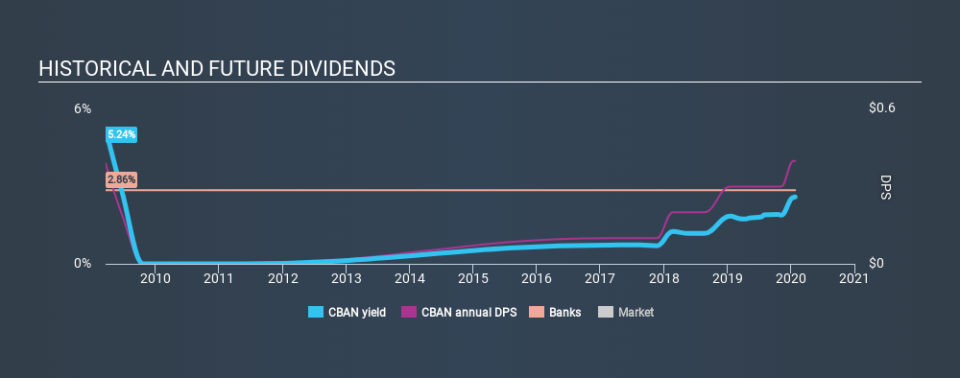Be Sure To Check Out Colony Bankcorp, Inc. (NASDAQ:CBAN) Before It Goes Ex-Dividend

Readers hoping to buy Colony Bankcorp, Inc. (NASDAQ:CBAN) for its dividend will need to make their move shortly, as the stock is about to trade ex-dividend. This means that investors who purchase shares on or after the 30th of January will not receive the dividend, which will be paid on the 18th of February.
Colony Bankcorp's upcoming dividend is US$0.10 a share, following on from the last 12 months, when the company distributed a total of US$0.40 per share to shareholders. Based on the last year's worth of payments, Colony Bankcorp stock has a trailing yield of around 2.6% on the current share price of $15.4. If you buy this business for its dividend, you should have an idea of whether Colony Bankcorp's dividend is reliable and sustainable. As a result, readers should always check whether Colony Bankcorp has been able to grow its dividends, or if the dividend might be cut.
View our latest analysis for Colony Bankcorp
Dividends are typically paid out of company income, so if a company pays out more than it earned, its dividend is usually at a higher risk of being cut. Fortunately Colony Bankcorp's payout ratio is modest, at just 27% of profit.
When a company paid out less in dividends than it earned in profit, this generally suggests its dividend is affordable. The lower the % of its profit that it pays out, the greater the margin of safety for the dividend if the business enters a downturn.
Click here to see how much of its profit Colony Bankcorp paid out over the last 12 months.
Have Earnings And Dividends Been Growing?
Businesses with strong growth prospects usually make the best dividend payers, because it's easier to grow dividends when earnings per share are improving. If business enters a downturn and the dividend is cut, the company could see its value fall precipitously. Fortunately for readers, Colony Bankcorp's earnings per share have been growing at 14% a year for the past five years.
Another key way to measure a company's dividend prospects is by measuring its historical rate of dividend growth. Colony Bankcorp's dividend payments are broadly unchanged compared to where they were ten years ago.
To Sum It Up
Is Colony Bankcorp an attractive dividend stock, or better left on the shelf? Typically, companies that are growing rapidly and paying out a low fraction of earnings are keeping the profits for reinvestment in the business. This is one of the most attractive investment combinations under this analysis, as it can create substantial value for investors over the long run. We think this is a pretty attractive combination, and would be interested in investigating Colony Bankcorp more closely.
Want to learn more about Colony Bankcorp's dividend performance? Check out this visualisation of its historical revenue and earnings growth.
If you're in the market for dividend stocks, we recommend checking our list of top dividend stocks with a greater than 2% yield and an upcoming dividend.
If you spot an error that warrants correction, please contact the editor at editorial-team@simplywallst.com. This article by Simply Wall St is general in nature. It does not constitute a recommendation to buy or sell any stock, and does not take account of your objectives, or your financial situation. Simply Wall St has no position in the stocks mentioned.
We aim to bring you long-term focused research analysis driven by fundamental data. Note that our analysis may not factor in the latest price-sensitive company announcements or qualitative material. Thank you for reading.

 Yahoo Finance
Yahoo Finance 
